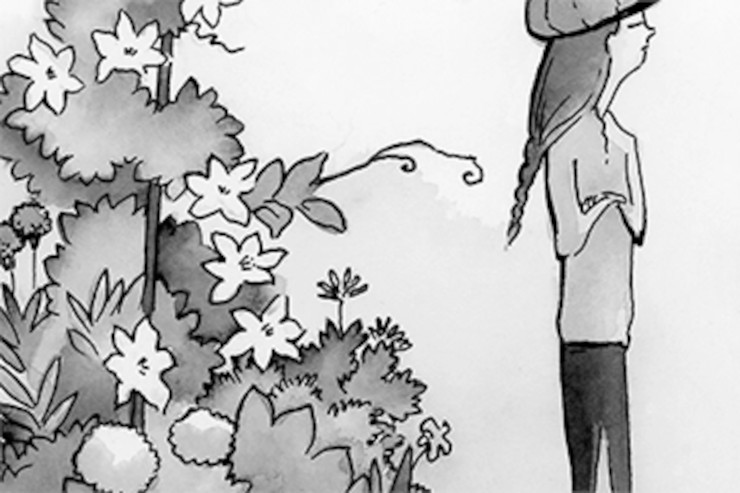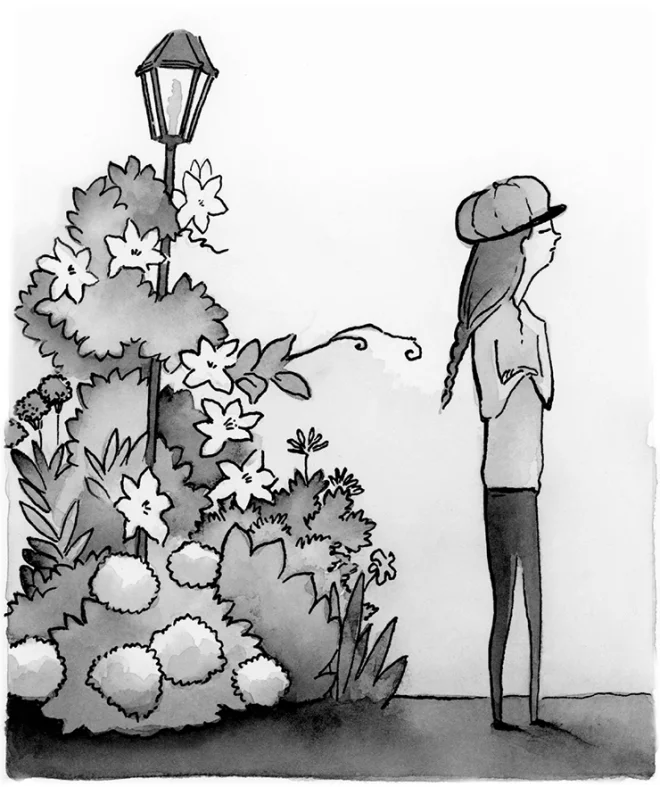
Let’s talk about the life and times of garden abandonment and garden rescues. See, there comes a time in the life of a garden when you need to take a break. Personally, I find this particularly true with landscapes and flowers because they require so much darned weeding. When we first bought our house, the landscaping was immaculate, thanks to the owners who owned a golf course and used their folks to keep it tidy.
When I adopted it, it looked simple enough, but by mid-July, I realized there’s nothing simple about keeping mulch weed-free and keeping shrubs from tripling in size at their leisure. Trying to learn what all the plants were seemed impossible, and so one season, I just gave up. And in the matter of a Summer, someone’s perfectly manicured gardens went away. Weeds took over, mulch broke down, and much as we tried the next year, there was no getting it back to its former glory. I’d tell my husband every other day how much I hated our ugly weed garden and plotted to turn it into grass.
The following Summer, though, I realized that tending to someone else’s garden was my first mistake. It’s hard to have a personal relationship with something you never created. And so I started my garden rescue, transforming “their” garden into “my” garden. I took down the thorny bushes I hated, then started planting. First with a batch of perennials, followed by another year of perennials, and another, until the mulch faded, and the weeds were more crowded out by rising flowers than not.
This week’s story, “The Garden and I” by Marsha McGregor, resonated so much with me because it reminded me of the letting-go process of a flower garden, especially in my case, one that was never mine. In her story, she says, “In demanding less of each other, we enjoyed each other more.” And I can’t think of a single line that an adoptive gardener can relate to more!
Other Garden Rescues and More
This story comes from our archive that spans over 30 years and includes more than 130 magazine issues of GreenPrints. Pieces like these that inject gardening humor into everyday life lessons always brighten up my day, and I hope it does for you as well. Enjoy!

Life is short, buy the plant
Working out our relationship.
By Marsha McGregor

My garden and I have reconciled.
The relationship had teetered for a year, then almost dissolved completely when I, in an attempt to give it some special attention, splurged on $75 worth of Casa Blanca lily bulbs and saw not one of them bloom. Ever. Two stalks appeared aboveground and sported promising buds, which were promptly eaten by the deer. The rest never appeared.
I blamed the garden for this, saying it was engaging in passive-aggressive retaliation for my neglecting to weed it the summer be-fore—never mind all my years of careful soil cultivation and pampering with compost. The garden claimed it was for lack of feeding and, oh, perhaps the choking weeds I left may have had a tad to do with it. A good garden psychologist—if such a person exists, and I’m sure one does—would suggest that this was a classic case of misplaced anger for factors outside of both parties’ control (I could have gotten some bum bulbs or the garden been the victim of a voracious chipmunk). Still.
The love affair had started naturally enough: Both of us were unattached, looking for a way to expand our creativity and nurturing instincts and have a little fun in the process. We started out slowly, with a perfectly reasonable perennial bed in the front of the house, investing in every foundational requirement for a solid future: deep tilling, sod removal, soil amendments, and an expensive pair of goatskin garden gloves.
Only then did the planting begin, and we were careful, respectful of each other’s needs and boundaries. When I began murmuring about lilacs, the garden cautioned me about its leanings toward acidity. I urged restraint when the rudbeckia started to run amok, saying we would have to slow things down a bit. We were in sync, the two of us. Life was good.
But then friends started coming over to admire us, asking us to pose together for happy pictures. One of the photos was even featured on the cover of a local magazine. There was tension as we readied ourselves for the cameraman, and I accidentally trampled on a pricey day lily we had recently acquired, which didn’t help matters.
It didn’t stop there. More serious gardeners than I began visiting, suggesting broader sweeps, a kidney-shaped extension, islands of bulbs, and groundcovers. I was lured by the temptation of an Eden. The garden, worried I was spreading my attentions too thinly, began protesting, and attempted to capture my notice with a wilting peony and a campanula that matted and refused to bloom.
But I was awash in visions of Sissinghurst and Giverny, fantasizing about a piece of heaven. Couldn’t I see that we already had the moon? Did we need the stars, as well?
No matter. Excavation began, and I had my kidney-shaped extension.
Then the flourishing ‘Henryi’ clematis that covered the lamp-post in the garden up and died. I was secretly convinced this was an attention-getting device, but I rose to the occasion. I weeded. I fertilized. I bought coordinating annuals. I staked and pruned, watered and thinned and divided. The garden had weeks of sheer loveliness and…and…
I got fed up with it. I couldn’t walk by it without giving it some kind of physical attention, and it was wearing me out. I began to distance myself, ignoring its entreaties for more quality time together. Finally, I no longer even noticed the perfect royal purple of its velvety Siberian iris, or the magical way the lady’s mantle held raindrops like diamonds in its cupped, serrated leaves. My garden had become a jealous lover, and it was time to break the news that I was starting to see other people.
I tried to explain: I love you, I admire you, you are worth the time, but…not all of my time. I have friends I haven’t seen for months. I have other things to do. I have bills to pay. I have…well, a life outside these borders.
It wasn’t pretty. We ignored each other for a full season. There was a telling late-Summer incident, when my son and his friends inadvertently formed a three-man pileup atop some prized Mt. Fuji phlox while playing touch football. I simply shrugged and walked away, leaving everyone open-mouthed and incredulous. But, really, how does one adequately explain the demise of a relationship to a ten-year-old?
But then one September day, long after admirers had stopped dropping over for photos or with plants, I noticed something as I walked past the garden to fetch the newspaper. It was the way the sun struck the iris foliage, still speckled with the sparkle of morning dew, gently swaying in the breeze. Yes, at its feet lay a tangle of straggly hosta, tattered from untreated slug attacks. And the lamppost, naked without its Henryi, leaned slightly toward the house, its rust showing. But the light on the iris stirred something in me, some faint, fond memory of coffee by the garden and bulb plantings in the crisp Autumn air. It came back: those mornings of possibility, spade and one precious clump of Canterbury bells in hand, and evenings of sore muscles, tempered by the satisfying smell of turned earth. Even the scented geraniums crushed between the fingers just before retiring to the bath.
I got the urge to dig.
Two days and nine hours of toil later (interrupted only by a feverish trip to the nursery for two hydrangeas, three bags of bulbs, and an embarrassing number of mums and ornamental cabbage), I sat back and admired the results. The garden’s resurrected beauty stunned me. I fairly oozed endorphins. I had not felt this way for a long, long time.
To its everlasting credit, the garden had waited for me. It had tolerated my indifference, adjusted to my neglect, and gone on to live its own life, inviting the company of less uptight locals—ironweed, wild asters, Queen Anne’s lace, goldenrod—that I have come to accept and admire as part of its charm.
We have mellowed towards each other, the garden and I, grown past that overly earnest first phase of our relationship, and chosen instead to focus on our own and each other’s natural assets. From this mellowing has come a certain unexpected reward:
In demanding less of each other, we enjoy each other more. ❖
By Marsha McGregor, published originally in 2018, in GreenPrints Issue #127. Illustrated by Dena Seiferling

Did this remind you of a similar garden rescue story you’d like to share? Leave a comment below, I’d love to hear it.



